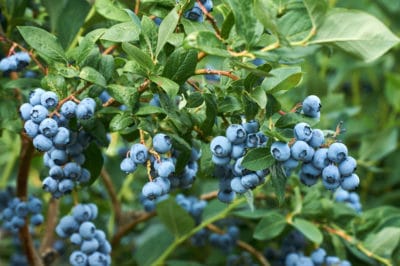Benefits of Applying Organic Fertilizer to Blueberries
Since blueberries have fine roots that only grow about 12-inches deep, they can’t absorb as much nutrients and water as deep-rooted plants. Blueberry roots also have trouble growing through compacted soil, so loosening the soil and adding organic matter helps them retain water, keeps the soil warmer and prevents weed growth.
Blueberry bushes can become easily injured by too much fertilizer, especially concentrated store bought products. Using organic matter is a natural alternative that provides all the nutrients your blueberry bushes need.
Why Blueberry Bushes Need Nitrogen
The most important nutrient that blueberries require is nitrogen, in fact it’s the only nutrient you really need to supplement. Nitrogen should be added to the soil in the spring before your blueberries have new growth. Nitrogen is critical for chlorophyll and photosynthesis. If your blueberry bushes lack nitrogen, the foliage will become pale and yellow. Two options for providing blueberries with nitrogen are spreading alfalfa meal to the soil or planting cover crops around your blueberry bushes.
When selecting a nitrogen source, avoid chemical additives, such as ammonium sulfate because they will destroy the beneficial microbes in your soil. It takes years for the microbes to recover. Also, avoid using nitrogen in the form of nitrate because it toxic to blueberries.
Planting Cover Crops as a Natural Nitrogen Source
You don’t have to be a farmer with several acres of farmland to reap the benefits of cover crops. Any home gardener can plant cover crops for a healthy garden. Compatible plants that provide nitrogen are alfalfa, clover, peas or hairy vetch. They work with bacteria in the soil, absorbing nitrogen out of the air and transferring it to root nodules. Plant any of these cover crops in the fall or spring, then turn them over into your soil or mow them with a lawnmower, leaving the clippings around your blueberry bushes.
Other Organic Sources of Nitrogen
Nitrogen also occurs naturally in several other organic sources. The following list are the most common animal and plant sources of nitrogen:
- Composted manure – This comes from grass-eating animals like cows, sheep and horses.
- Poultry manure – This contains nitrogen, phosphate and potassium. The downside is that it also has lots of ammonia, so you have to let it sit for four months before using it around your blueberries.
- Blood meal – This nitrogen source comes from waste from slaughterhouses. It is very strong, so you have to mix it with water and apply it with a watering can or sprayer.
- Fish emulsion – This can be very stinky. It comes in liquid form, and you soak the soil with it monthly.
- Feather meal – This comes in the form of pellets. It’s made of chicken feathers. As the pellets break down, they supply a long-lasting source of nitrogen. You can put these around your blueberry bushes in the spring.
- Alfalfa meal – This meal provides nitrogen, potassium and phosphorous to the soil. Apply lightly to the soil and avoid touching any canes.
- Soybean meal – This slowly releases nitrogen into the soil.
Applying Organic Mulch to Blueberry Bushes
Organic matter benefits blueberries by adding nutrients, maintaining moisture and soil temperature. The following organic matter options provide blueberries with the nutrients they need for vegetative growth and fruit production:
- Green manure
- Coffee grounds
- Sphagnum peat
- Old sawdust
- Dried leaves
Applying compost around your blueberry bushes reduces disease and pest infestations, as well as keeping weeds under control. Compost also prevents the soil from becoming compacted, so your bushes can absorb the nutrients and water they need. It’s worth the effort to supplement the nitrogen in your soil when it comes time to pick your yummy, ripe blueberries.
